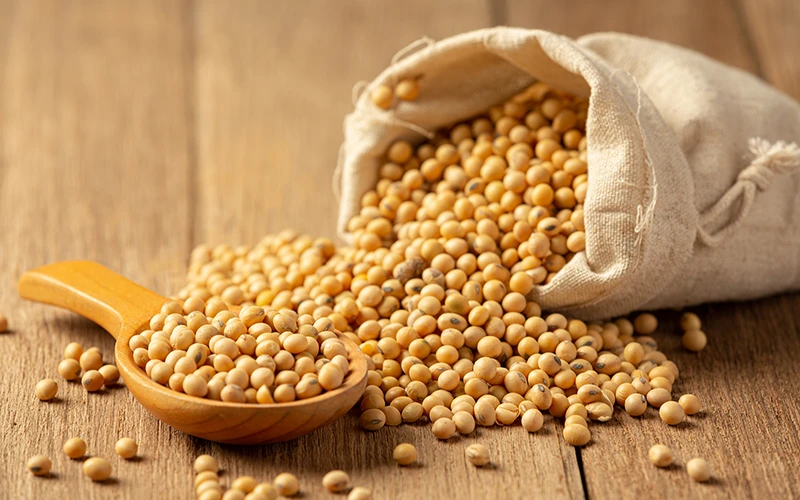Soybeans, also known as soya beans, are a type of legume that is widely cultivated for its versatile uses. They are native to East Asia but are now grown in various regions worldwide. Soybeans have gained popularity due to their nutritional value and diverse applications in both food and non-food industries. Here are some key points about soybeans:
- Nutritional Profile: Soybeans are considered a complete protein as they contain all the essential amino acids necessary for human nutrition. They are also rich in dietary fiber, healthy fats (including omega-3 fatty acids), vitamins (such as folate and vitamin K), and minerals (including iron, calcium, and magnesium). Soybeans are a valuable source of plant-based protein, making them particularly important for vegetarian and vegan diets.
- Culinary Uses: Soybeans are used in various forms in cooking. Whole soybeans can be boiled or steamed and used as a nutritious addition to salads, soups, and stews. They can also be fermented to make products like soy sauce, tempeh, and miso. Soy milk, made by grinding soaked soybeans and straining the mixture, serves as a dairy milk alternative. Soybean oil is commonly used for cooking and as an ingredient in processed foods.
- Tofu and Soy Products: Tofu, also known as bean curd, is a popular soy product made by curdling soy milk and pressing it into solid blocks. Tofu is a versatile ingredient and can be used in both savory and sweet dishes. Other soy-based products include soy-based meat substitutes, such as soy burgers or soy sausages, which are commonly used by individuals following a vegetarian or vegan diet.
- Non-Food Uses: Soybeans have various non-food applications. Soybean oil is used in the production of biodiesel, a renewable and environmentally friendly alternative to conventional diesel fuel. Soybean meal, which is the byproduct remaining after extracting oil from soybeans, is used as animal feed due to its high protein content.
- Health Benefits: The consumption of soybeans has been associated with several potential health benefits. The isoflavones found in soybeans have estrogen-like properties and may help alleviate certain menopausal symptoms in women. Soy protein has also been linked to lower cholesterol levels and a reduced risk of heart disease. However, individual responses to soy products may vary, and it is recommended to consult with a healthcare professional for personalized advice.
- GMO Concerns: Genetically modified soybeans, known as genetically engineered (GE) soybeans, are widely cultivated. These soybeans have been genetically modified to exhibit specific traits, such as herbicide resistance. As with other genetically modified organisms (GMOs), there is ongoing debate and concerns regarding their potential environmental and health impacts.
It’s important to note that while soybeans are generally safe for consumption, some individuals may have allergies or sensitivities to soy products. Additionally, certain individuals with specific health conditions, such as thyroid disorders, may need to moderate their soy intake or seek guidance from a healthcare professional.
Soybeans are a versatile and nutritious crop that serves as a source of plant-based protein and finds applications in various industries.
Regenerate response
Screenshot



